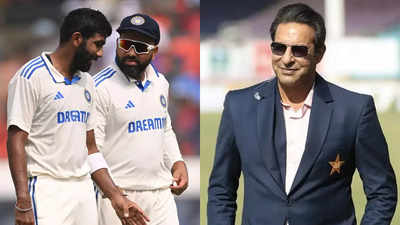
NEW DELHI: The cricketing world has been buzzing after India’s shocking 0-3 series whitewash at home by New Zealand, their first-ever defeat of such magnitude in Test cricket on home soil.
With India’s struggles against quality spin bowling in the spotlight, former England batter Michael Vaughan and Pakistan legend Wasim Akram have sparked a fresh debate on the possible outcome of a Test series between India and Pakistan.
During commentary for the Australia vs Pakistan first ODI at the MCG, Vaughan suggested that the current form of both sides could lead to an intriguing contest. “I would want to see a Test series between India and Pakistan,” Vaughan remarked, highlighting the potential excitement such a clash could bring.Akram agreed, stating, “It will be massive. It will be good for the game, for two cricket-crazy nations.”
The conversation took an interesting turn when Vaughan claimed, “Pakistan can now beat India on the turners,” referencing India’s recent struggles against spin at home.
Akram echoed the sentiment, adding, “Pakistan have a chance to beat India in Tests now on a spinning track. They have been hammered by New Zealand 3-0 at home.”
The comments came after Pakistan’s remarkable come-from-behind 2-1 series win against England on turning pitches, while India faltered against New Zealand’s spinners. Mitchell Santner and Ajaz Patel were particularly effective in dismantling India’s famed batting lineup during the series.
With both teams showing contrasting form on similar pitches, the prospect of a Test series between India and Pakistan, who haven’t faced each other in Tests since 2007, is being eagerly discussed.
